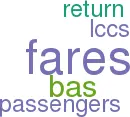BA's response to the LCCs
May 2003


BA has taken the leading role in responding to the LCC threat, hardly surprising as it is the Euro–major most exposed to their expansion (the table below illustrates the dominance of LCCs in the delivery schedules over the next 18 months).
BA’s strategy to counteract the LCC threat includes: rescheduling the network, including de–hubbing Gatwick; closing marginal or loss–making routes; basing fewer aircraft away from Heathrow; outsourcing; and lowering distribution costs by selling a greater percentage of tickets directly.
BA has changed its inventory management techniques in the short–haul market and copied the model used by the LCCs. (see Aviation Strategy, April 2003). Booking classes that close are never re–opened.
Passengers are encouraged to book early, improving the airline’s cash flow.
At present BA is still refining its offer to passengers. BA currently has three types of fare in the UK domestic market, which it describes as fully–flexible, semi–flexible and non–flexible. In Europe it continues to maintain a two–night stay rule if passengers want to access the cheapest fares. Peter Lewis, General Manager Short–Haul Pricing for BA, admitted at a recent Brussels Aviation Club meeting that BA’s website was "still way behind that of easyJet and Ryanair, but becoming more user friendly".
Lewis described the semi–flexible fares as not working in their own right and observed that further simplification was required. Oneway fares were not available at present on the website, but will be introduced. Also, change fees will be introduced.
BA has worked hard through extensive advertising campaigns to persuade customers that it too provides low fares.
But the increased visibility on the websites pose a danger.
The cheapest economy return fares available on BA.com to Brussels and Frankfurt respectively are £34 and £44 return. These are clearly not fares that BA’s cost structure can support. Where BA would make money is on the business class fares, which are respectively £440 and £532 return. Are such differentials sustainable?
| 2003-04 | Total | ||||||||
| 717 | 737 | 757 | A318 | A319 | A320 | A321 | Deliveries | backlog | |
| Easyjet | 11 | 56 | 67 | 131 | |||||
| Southwest | 61 | 61 | 114 | ||||||
| ILFC | 10 | 3 | 17 | 10 | 16 | 56 | 298 | ||
| CIT | 10 | 4 | 6 | 25 | 5 | 50 | 59 | ||
| GECAS | 13 | 10 | 4 | 4 | 15 | 46 | 116 | ||
| Northwest | 7 | 22 | 8 | 37 | 37 | ||||
| JetBlue | 36 | 36 | 112 | ||||||
| Ryanair | 32 | 32 | 120 | ||||||
| Continental | 24 | 3 | 27 | 67 | |||||
| Boullioun | 5 | 5 | 11 | 3 | 24 | 33 | |||
| Midwest | 24 | 24 | 24 | ||||||
| WestJet | 22 | 22 | 23 | ||||||
| Air France | 15 | 1 | 3 | 19 | 19 | ||||
| Debis | 7 | 7 | 5 | 19 | 30 | ||||
| Delta | 17 | 17 | 61 | ||||||
| SALE | 2 | 13 | 1 | 16 | 23 | ||||
| Aeroflot | 5 | 10 | 15 | 18 | |||||
| Malev | 15 | 15 | 15 | ||||||
| Air China | 6 | 8 | 14 | 14 | |||||
| British Airways | 2 | 8 | 4 | 14 | 21 | ||||
| Air New Zealand | 13 | 13 | 15 | ||||||
| ATA | 11 | 2 | 13 | 13 | |||||
| China Southern | 8 | 4 | 12 | 17 | |||||
| Alaska Airlines | 11 | 11 | 11 | ||||||
| China Eastern | 11 | 11 | 18 | ||||||
| Iberia | 0 | 6 | 5 | 11 | 26 | ||||
| Virgin Blue | 11 | 11 | 11 | ||||||
| Others | 2 | 58 | 5 | 6 | 43 | 67 | 36 | 217 | 398 |
| Total | 26 | 325 | 17 | 38 | 182 | 232 | 90 | 910 | 1,844 |